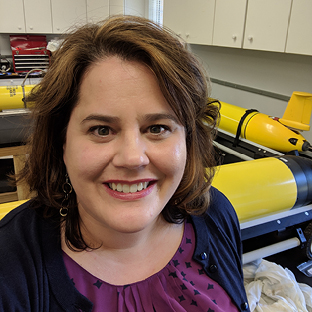Catherine Edwards, Ph.D.
Adjunct Assistant Professor

Skidaway Institute of Oceanography
10 Ocean Science Circle
Savannah, Georgia 31411
United States
Explores physical oceanography of the continental margins
Education
- Ph.D., Physical Oceanography, University of North Carolina at Chapel Hill, 2008
- B.S., Physics , University of North Carolina at Chapel Hill, 1999
Awards & Honors
- Member, Leadership Savannah class of 2014
- Thomas S. and Caroline H. Royster Fellow, University of North Carolina, 2003-2008
- One of four non-faculty speakers chosen for the Carolina Speakers Bureau (UNC), 2003-2009
- Recipient of U.S. Navy Special Act Award for emergency real-time modeling support to the Spanish government, Mar. 2003
- Selected to attend the Third Summer School on Inverse Methods and Data Assimilation, Oregon State University, Jul. 22-Aug. 2, 2002
- Recipient of AGU 2000 Scholar Fellowship, Jan. 2000
- Summer Student Fellow, Woods Hole Oceanographic Institution, Summer 1999
- Recipient of Science Opportunity Fellowship (NSF), May 1997-May 1999
- SOARS (Significant Opportunities in Atmospheric Research and Science) Fellow, National Center for Atmospheric Research, Summer 1998
Areas of Expertise
Dr. Edwards’ research focuses on the physical oceanography of the continental margins, where shelf-scale processes can have complicated interactions with topography and stratification at the nearshore boundary as well as the shelfbreak. Her current work takes a joint observational / modeling approach to describing the response of the coastal ocean to near-resonant forcing by sea breeze and land breeze near the critical latitude for diurnal / inertial resonance. Heating and cooling of shelf water also induce significant diurnal and supertidal variability in the coastal ocean, but the importance of air-sea interaction and subsynoptic meteorological variability is often neglected for circulation and ecosystem modeling on a regional scale. This higher frequency variability in the ocean and atmosphere (and associated mixing) has important implications for larval transport, nutrient budgets, and the larger coastal ecosystem.

Skidaway Institute of Oceanography
10 Ocean Science Circle
Savannah, Georgia 31411
United States
